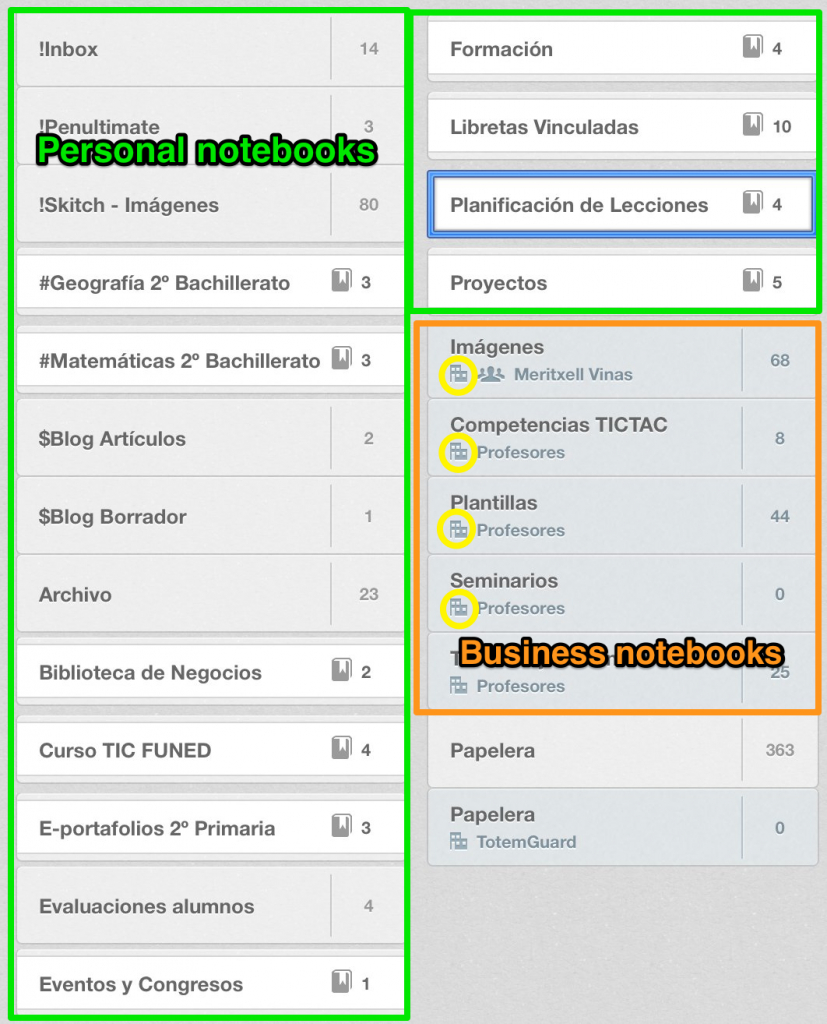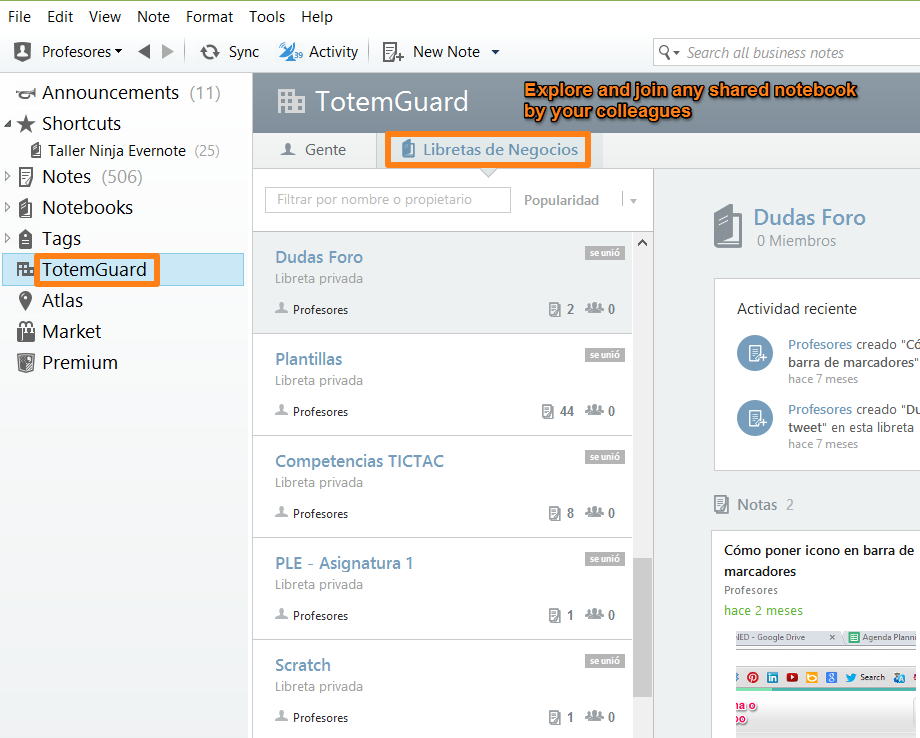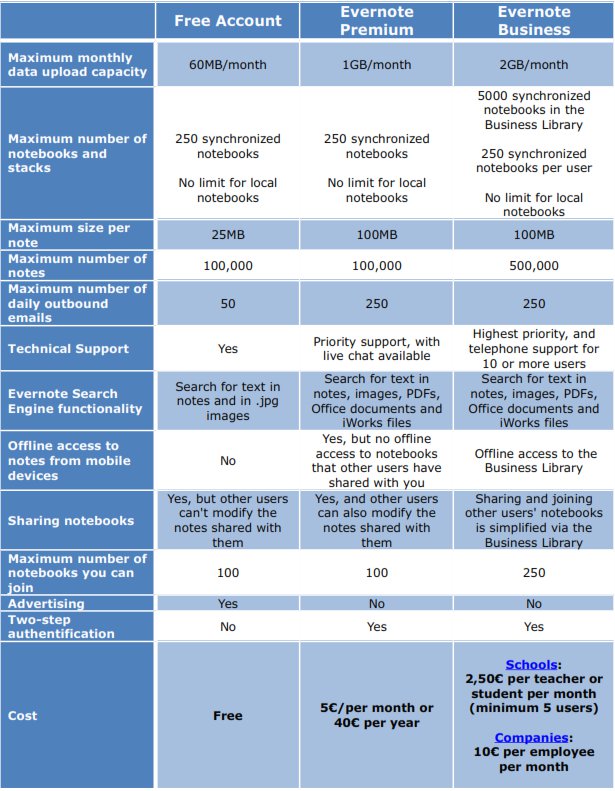One of the questions I am asked most often by teachers when they start using Evernote is what type of account they need to use the application most efficiently. The choice ends up mainly depending on how much you will use the program and whether you will exhaust the monthly storage capacity that is included in the free Evenote account. I will explain the details of the three types of accounts on offer (Free, Premium and Business for Schools) so that you can evaluate the specific functionality of each one and what they will cost annually.
Evernote Business for Schools
75% of Evernote users use the tool for both personal and professional purposes. With that in mind, Evernote designed Evernote Business, which allows a school to offer its teachers (or students) a group Evernote account, which allows them to work more productively and collaboratively.
The school is the owner of the Evernote Business account and assigns one or more people to be administrators of the account. The school pays for this license, so that each teacher and student that uses the account does not have to pay individually for their own Premium account.
Teachers and students that already have their own personal Evenote account can upgrade to Evernote Business without needing to create a new account, and without infringing upon the privacy of their pesonal data that they already have stored in their existing account.
The account administrator is the only one who has permissions to add or eliminate users from the Evernote Business account, although they can extend automatic pre-authorization to the account for any teacher or student with an email address from a specific domain (for example, @harvard.edu).
Evernote Business is aimed especially for working in teams, and offers a range of specific advantates over Premium or free acocunts:
Business Notebooks
When you open or join an Evernote Business account, the Business notebooks appear in your personal Evernote account.
The Business notebooks and the personal notebooks appear separated into two different sections, which are both visible on the same page. The notebooks are organized by 2 different colors, so that you can clearly see which ones pertain to work and which ones are strictly personal.
In Windows the personal notebooks are white, and the business notebooks are light blue. In Mac, the personal notebooks are brown and the business notebooks are grey. Additionally, the business notebooks are marked with an icon of a building.
1. Each teacher has the option to make any Business notebook visible to colleagues or even students, to be able to share knowledge and projects with them. However, they also can keep a Business notebook private, where no one else is allowed to access it.
However, all of the Business notebooks are always accesible and controllable by the account administrator, from the admin console. Even in the event that a teacher were to erase these notebooks, the administrator can easily restore them from the admin console and the administrator is the only person who can delete them permanently.
On the other hand, the personal notebooks continue to always be private and completely controlled only by the account user. No one else can access them unless they have been shared with that person.
2. The Business notebooks and their content are property of the school, which guarantees the continuity of work and insures that the accumulated knowledge and the educational material created are not lost when a teacher leaves the school.
In this sense, if a teacher leaves their job at a school, the account administrator will deactivate their Business notebooks from the administration console and this section will disappear from that teacher’s personal Evernote account. The other teachers in the school can continue to access these Business notebooks and the administrator can even reassign them to another teacher who replaces them in the school.
The personal notebooks and their content always remain property of the individual user of the account. When a teacher leaves a school, their personal notebooks will of course stay intact within their Evernote account, and they will be able to continue to access them for personal use.
3. A place to centralize all knowledge. Sharing notebooks and working collaboratively really is easier with Evernote Business, compared to the free or Premium versions. This is because of the incorporation of a common space accessable to all the teachers (and/or students), where each one can publish their business notebooks, making them visible to the others.
This central space allows any teacher to share their notebooks and additionally they can look at the profiles of their colleagues, including what contact they have shared and their recent activity. This way, each teacher can freely consult this collection of shared notebooks and join them in order to view their content and contribute their knowledge, without having to have been previously invited by the owner of the notebook, as would be the case in Premium accounts.
This common space serves as a collective knowledge base for the school and allows the teachers from different departments to explore the work done by others and take advantage of it.
Its intelligent search engine is also capable of showing you interesting content created by other colleagues that is directly related with the topics you have included in your notes, allowing you to discover relevant information that could be useful in that moment.
In this sense, imagine that you are preparing a lesson about climate change and that you are introducing multimedia content in a note. Evernote will automatically look in the notes related to this topic that were published by other teachers, and will show them to you for you to inspect and use if you see fit.
Differences between types of Evernote accounts
1. Maximum monthly storage space
Evernote limits you in the amount of information you can upload in a 30 day period. In this sense, Evernote Business has one additional advantage over the other accounts.
Each user has 2GB of memory each month, but Evernote adds up all the available memory amongst all the users of a Business account, and can distribute it unequally amongst the users according to their usage of Evernote. In other words, if our Evernote Business account has a group of 10 teachers then we have a total monthly storage allocatioin of 20GB (2GB x 10), but we would be allowed for one teacher to use 4 GB, and another to only use 1GB as long as the total of 20GB is not exceeded for the month.
Keep in mind that 2GB per month is a huge amount of memory, and that it would be very difficult for a typical teacher to surpass that in a month, but nonetheless Evernote also allows the purchase or up to 25GB of additional memory space for Premium and Business accounts.
2. Maximum number of notebooks and stacks
The synchroized notebooks are what are stored in the Evernote servers and can be accessed from any pc, tablet or mobile device. The local notebooks are saved only on your pc and are not sent to the Evernote servers.
3. Maximum note size
Due to this restriction on note size, you need to keep in mind that regardless of the type of account you have, you can not save files that take up more than 100MB in Evernote, for example high resolution photos or video.
4. Sharing notebooks
- Free account: With the free Evernote account you can share notebooks with other Evernote users, but you can not give them permissions to create and edit the notes. This means that while they can see the notes, they can not add their own information or comments within your notebook. You can, however, join notebooks that other Evernote users share with you. If the notebook owner has a Premium account and gives you the permissions, then you will be able to create and edit notes within this notebook.
- Premium account: With a Premium account you can share notebooks and give permissions to create and modify notes to other users if you wish to do so.
- Evernote Business: In Evernote Business you have the same possibilities to modify notes in shared notebooks but there exists a common space where notebooks are accessible to all the teachers, where each user can publish their notebooks and create a group knowledge base for the school. In this way, each teacher can freely consult this collection of notebooks and join them to view them and if appropriate to contribute their knowledge to them.
5. Two-step account authentification
Given the frequency of hackers attacking technology companies, Evernote offers two-step account authentification. Two-step authentification is used to establish the authenticity of an online identify, and can reduce the risks of a stolen password or of a “phishing” attack.
The majority of users only use one layer of security, their password, to protect their accounts. With two-step authentification, they are protected by something they know (their password) as well as by something they possess (their mobile phone).
If a hacker is able to breach the security of your account password for Evernote, they still need another step, access to the mobile phone associated with your account, to gain entry to the account. Evernote will send a numerical code to your mobile phone, which you need to introduce in order to verify that it is really you that is trying to access the account each time you connect to Evernote from a new pc or mobile device.
6. Advertising
In the free version of Evernote the advertising that you will see is exclusively for products related to the application. You will not see Google Ads, for example, and you will not see invasive banner advertising during your use. Evernote also will not sell your personal contact details to any third party.
7. Security
Evernote guarantees the privacy of the data in your personal and professional accounts, which no one can access without your previous permission. On their website you can consult their Privacy Policy in more detail and you can also learn about the Evernote’s Three Laws of Data Protection: Your Data is Yours, Your Data is Protected and Your Data is Portable.
If you are thinking about using Evernote in your school, if you have any questions or if you want to pass on your experiences with Evenote, or if you are interested in contracting my training services you can contact me at comunicacion@totemguard.com
If you still aren’t using Evernote you can register and get a free one month Premium account here, increasing your storage space to 1GB during the month.







